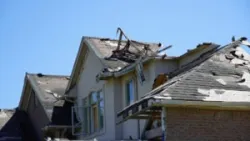
In the aftermath of a hurricane or other catastrophic event, there are few things more disheartening than the insurance company denying your claim. You paid insurance premiums for years, only to have the insurer fail to keep their end of the bargain when you need their help the most.
Our attorneys understand what it takes to hold insurance companies accountable. For over 40 years, our firm has helped homeowners during some of the toughest times of their lives. Our experienced homeowners insurance claims lawyers in Corpus Christi can answer your questions and aggressively pursue the outcome you deserve.
Steps To Take When Your Homeowners Insurance Claim is Denied
The steps you take following wind damage can have a significant impact on the outcome of your insurance claim. You could improve your chances of success by taking care to file your claim and follow up with your carrier, but mistakes could also increase your chances of receiving an insurance claim denial.
Review Your Homeowners Policy
Standard homeowners insurance policies will typically not cover every loss stemming from a storm. For example, most policies do not include insurance coverage for flooding. The same is not true when it comes to wind damage, which is generally covered by your insurance provider. It is still a good idea to review the terms of your policy after a loss, as this type of coverage is not universal. Policies for homes in high-risk areas often require additional riders before an insurance provider will pay for wind damage.
Contact Your Insurance Agent or Company
To secure compensation for your losses, you must contact your insurance agent or company to report the claim. The company will generally conduct their own investigation, which may involve insurance adjusters reviewing the damage to your property. It is crucial to notify them immediately after a loss, as failing to do so could have consequences for your claim.
Prevent Further Property Damage
If it is safe to do so, boarding up the property to prevent further damage can be beneficial. While the wind can take its toll on the property, allowing water in through broken windows will only make things worse. The failure to perform temporary repairs to mitigate these losses could even result in a reduced settlement with your insurance. This step is only viable if the building is structurally sound. Your health and safety should always be your top priority.
Speak With a Lawyer
One of the most important steps you can take after wind damage to your property is to discuss your case with an attorney. You are not obligated to hire a lawyer for a wind damage claim, but not doing so could lead to a disappointing outcome.
Your attorney can handle every aspect of your claim. This starts with negotiating with the insurance carrier on your behalf. While the insurer might seem firm in their denial, our attorneys have learned they are less likely to rely on bullying tactics when we are involved in the case. We can file a lawsuit on your behalf in cases where negotiations with the insurer are not fruitful.
We have offices in Houston, Corpus Christi, and Victoria; and will travel to any corner of Texas if we are capable of preventing an injustice.

Different Types of Storms
Wind damage is often associated with hurricanes, but there are other storms that could cause major structural damage to your home and property. While your homeowners policy may cover hurricane losses, your current policy might also pay for damage from other storms as well.
Tropical storms can also cause catastrophic property losses, but they differ in form and severity compared to a hurricane. These storms also form over water and are often the precursor to a hurricane. However, despite having less forceful winds, these storms can still cause catastrophic property damage.
Severe wind is possible outside of these weather events. Strong winds can occur due to different factors, leading to damage to your property when you least expect it. The good news is that most homeowners policies will cover these losses.
Insurance Companies Can Act in Bad Faith
In the aftermath of a weather disaster, insurance companies are often overwhelmed with claims for storm damage. It is one thing if their response time is sluggish or their communication leaves something to be desired. It is another if they actively work to deny your claim or limit your recovery through underhanded tactics.
Proving they acted in bad faith can be difficult. After all, there are viable reasons that allow these carriers to reject a claim or offer a limited settlement. Bad faith usually involves actions or inactions that clearly show the company never intended to genuinely consider your claim. According to Texas Insurance Code § 541.060, this behavior can include the following:
- Refusing to respond to your initial claim
- Wasting time or delaying the process unnecessarily
- Refusing to investigate your loss
- Making an unreasonably low offer
- Failing to acknowledge correspondence from you
- Denying your claim without a reason
Our attorneys are here to help you fight back against these tactics. If you successfully sue the insurer, your bad faith claim can provide you with damages up to triple your actual losses. This is done in order to prevent companies from treating other policyholders this way in the future. You may also be entitled to your legal fees through this process as well.
Representing the injured in all areas of Texas that extends back over 40 years

Discuss Your Wind Damage Claim Denial with Our Law Firm Today
If you believe your wind damage claim was unfairly denied, you still have the chance to get the outcome you deserve. Insurance companies are not immune to making mistakes, and the right attorney could help reverse your claim denial and get you the money you need to rebuild.
The unfortunate reality is that insurance carriers will not always treat you fairly. If you believe they have acted in bad faith, we can take the steps necessary to hold them accountable and get the compensation you deserve. At Carrigan & Anderson, PLLC, we are ready to aggressively advocate on your behalf. Contact us right away to discuss your legal options during a free consultation.
At Carrigan & Anderson, PLLC we can talk to you about your options and rights.


